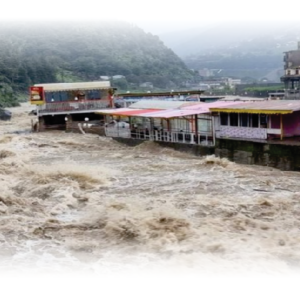Since the Industrial Revolution, global dynamics have undergone significant changes, driven by environmental challenges that have culminated in the crisis of climate change. Recognizing its profound implications for humanity and the environment, the United Nations incorporated climate action into its Sustainable Development Goals (SDGs). Pakistan is among the nations most affected by climate change. In 2022, the country faced unprecedented heavy rainfall and subsequent floods, creating a dire humanitarian crisis. Approximately 33 million people, including 16 million children and adolescents, were affected, highlighting the vulnerability of its population to climatic events. These challenges call for urgent action to implement adaptive strategies and safeguard future generations.
The people of Pakistan contribute minimally to global carbon emissions, yet they are among the most vulnerable to its impacts. Indigenous communities, particularly in the province of Khyber Pakhtunkhwa, face severe challenges despite their minimal contribution to the country’s carbon footprint. This province, known for its picturesque valleys and economic significance, is home to a significant number ofindigenous populations who are disproportionately affected by climate disasters. The high illiteracy rate in Khyber Pakhtunkhwa exacerbates the region’s vulnerability. Climate-induced events like floods and droughts often force families into desperate measures. In many cases, young girls are married off to ease the financial burden on their families, depriving them of education and jeopardizing their health. Such practices deepen the socio-economic challenges faced by these communities. Climate change is a key driver of these cascading issues, standing at the intersection of environmental, social, and economic crises. Addressing this global challenge requires targeted interventions to protect vulnerable populations and provide sustainable solutions that prioritize education, gender equality, and disaster resilience.
 The government of KP has initiated several efforts to address the climate crisis, with notable projects such as the “Billion Tree Tsunami Afforestation.” This initiative, aimed at combating deforestation and promoting carbon sequestration, has resulted in the planting of over a billion trees in the province and garnered recognition from international organizations, including the United Nations. While the project is commendable, its implementation has faced significant challenges. Reports suggest that the actual execution fell short of the ambitious plans initially proposed, with issues such as corruption and mismanagement limiting its full potential. For instance, discrepancies in the number of trees planted and insufficient monitoring mechanisms have raised concerns about transparency and effectiveness. To maximize the impact of such initiatives, it is essential to strengthen governance, enhance accountability, and ensure proper resource allocation. By addressing these challenges, KP can solidify its role as a leader in climate action and secure a sustainable future for its people and environment.
The government of KP has initiated several efforts to address the climate crisis, with notable projects such as the “Billion Tree Tsunami Afforestation.” This initiative, aimed at combating deforestation and promoting carbon sequestration, has resulted in the planting of over a billion trees in the province and garnered recognition from international organizations, including the United Nations. While the project is commendable, its implementation has faced significant challenges. Reports suggest that the actual execution fell short of the ambitious plans initially proposed, with issues such as corruption and mismanagement limiting its full potential. For instance, discrepancies in the number of trees planted and insufficient monitoring mechanisms have raised concerns about transparency and effectiveness. To maximize the impact of such initiatives, it is essential to strengthen governance, enhance accountability, and ensure proper resource allocation. By addressing these challenges, KP can solidify its role as a leader in climate action and secure a sustainable future for its people and environment.
The government of Khyber Pakhtunkhwa (KP) has invested in small to medium-scale hydropower projects to reduce dependence on fossil fuels and transition to renewable energy.
However, these efforts lack adequate attention from policymakers, limiting their progress. KP has well-documented environmental policies that, if effectively enforced, could significantly improve the situation. However, enforcement remains weak, particularly in areas such as industrial compliance and waste management.
Most emissions in KP come from the transportation sector, with a significant number of vehicles emitting harmful pollutants across the province. The Torkham border, a key route for heavy goods transportation, further exacerbates air quality issues. While there is potential for impactful measures, the province continues to rely on inadequate, short-term solutions that fail to address the root of the crisis effectively.
While planting trees is a valuable initiative, it alone cannot fully address the complex issue of climate change. The crisis is driven by excessive greenhouse gas emissions, particularly carbon dioxide from fossil fuel industries and coal-powered plants. A comprehensive approach, including reducing reliance on fossil fuels and transitioning to renewable energy, is essential for meaningful progress.
Khyber Pakhtunkhwa faces significant challenges in addressing climate change, with its efforts falling short of the scale required. While commendable strides have been made, a more holistic and sustainable approach is urgently needed. Stronger policy enforcement, investment in renewable energy, and the development of eco-friendly infrastructure are crucial steps forward.
Targeting inefficient policies and ensuring climate-efficient reforms must become a priority. Area-specific solutions are essential, as laws crafted by leaders unfamiliar with affected communities often fail to address their needs. Equal representation from all communities in decision-making processes is critical for effective climate action.
Additionally, the province must prioritize awareness campaigns in remote areas, fostering a better understanding of climate issues. Engaging youth in decision-making can bring fresh perspectives and drive long-term change. Mandatory divestment from fossil fuels and stricter monitoring of industrial practices are also imperative.
Despite promises to transition to eco-friendly solutions, progress has been hindered by financial constraints and a lack of stakeholder interest. KP urgently needs a comprehensive climate action plan. Without immediate action, the future of its people—and the generations to come—remains at grave risk.
Written By: Fatima Faraz





